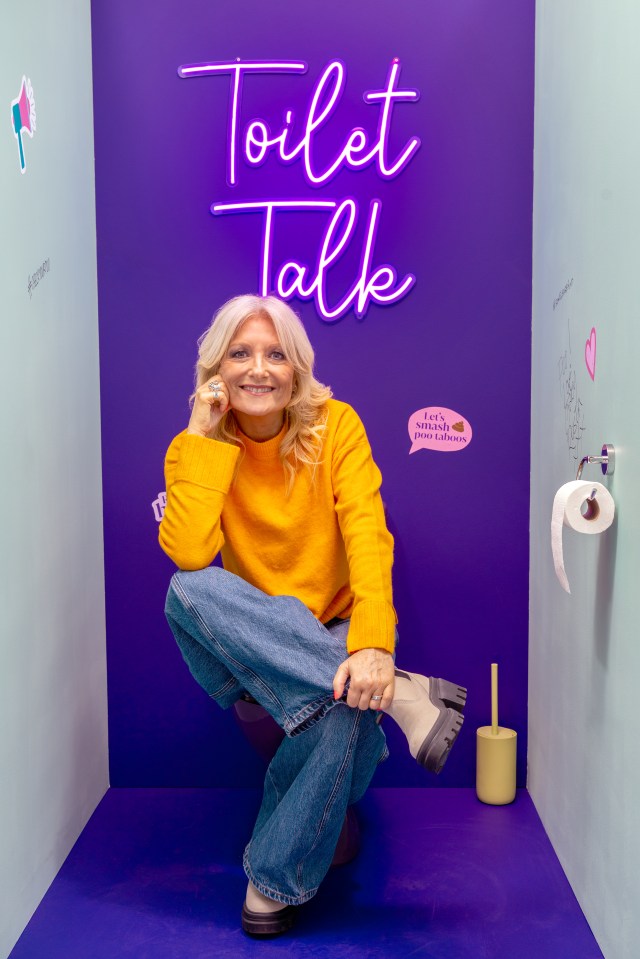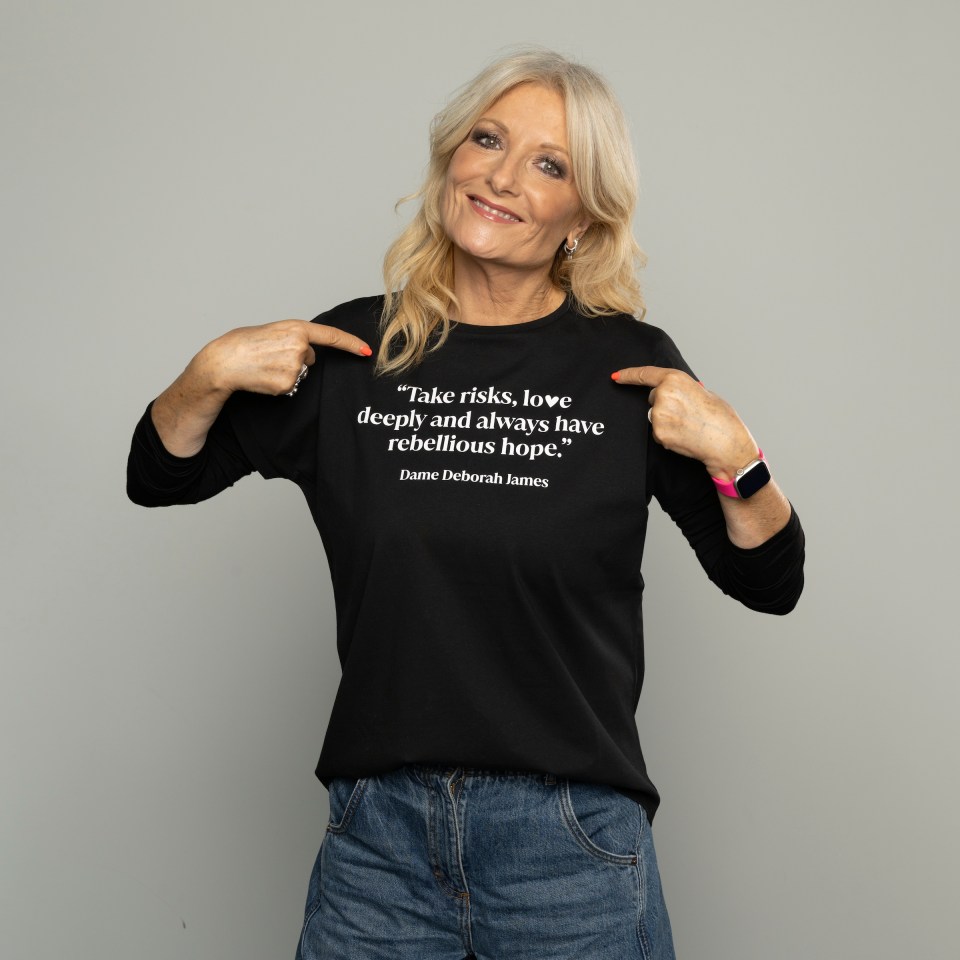Gaby Roslin’s Powerful Bowel Cancer Message: Let’s Talk About Poo

In the glamorous yet often hidden world of celebrities, not everything shines brightly. As we observe Bowel Cancer Awareness Month, numerous stars are bravely sharing their personal “poo tales” to shed light on this important issue. Bowel cancer, the fourth most prevalent cancer in the UK, sees approximately 44,000 new cases each year. However, early diagnosis can significantly improve outcomes.
Today, Gaby Roslin, the renowned TV and radio presenter, is bravely addressing a health scare she experienced after discovering blood in her stool. Launching today is a new social media initiative called The Toilet Talk, inspired by the late Dame Deborah James, who tragically passed away from bowel cancer at the young age of 40 in 2022. Gaby, now 60, is among those stepping up to share their most embarrassing moments, asserting, “If this series helps even one person catch their bowel cancer early, it’s absolutely worth it.”
The aim of this series is to encourage open conversations about bowel health among friends, family, and trusted individuals. By fostering these discussions, it is hoped that more people will feel empowered to consult a doctor if they notice any unusual changes. Alarmingly, nearly one third of UK adults admit they would feel too embarrassed to discuss bowel issues with their doctor, according to recent data.
Speak Up, Don’t Sit on It

“If you see blood or experience changes in your stool, don’t just sit on it—go see a doctor!” Gaby emphasizes. Dame Deborah, affectionately known as Debs, founded the Bowelbabe Fund in partnership with Cancer Research UK after years of working tirelessly to break the “poo taboo” and raise awareness of this disease. Diagnosed at the age of 35, she often dismissed her symptoms—such as frequent bathroom visits and extreme fatigue—as merely the burdens of being a busy, working mother.
When she returned to her parents’ home in Woking to spend her final days, she set out to raise an initial target of £250,000 for her fund. She not only exceeded that goal but, before her passing in June 2022, the total had reached an incredible £6.7 million. Today, that figure has soared to over £17 million. Recently, the Fund announced its 11th project, pledging £2 million to the CRC-STARS initiative, which will involve over 40 leading scientists from the UK and Europe studying personalized medicine for bowel cancer patients.
Reflecting on her late friend Deb, Gaby shares, “Her wicked sense of humor and relentless passion for raising awareness have undoubtedly saved countless lives. She showed that discussing bowel cancer doesn’t have to be frightening; it can even be joyous.” Gaby has been advocating for bowel cancer awareness for nearly three decades.
Her father, Clive, a former BBC radio announcer, was diagnosed with bowel cancer in the late 1990s, a time when even uttering the word “bowel” was considered taboo on television. Gaby recounts, “During an interview, the journalist said, ‘Sorry Clive, you just can’t say poo.’ Dad replied, ‘But that’s precisely what I’m discussing—bowel cancer!’”
Deborah, a mother of two, once donned a poo costume on public transport, exuding glamour while advocating for awareness about the signs and symptoms of bowel cancer. Gaby recalls, “I knew I had to have her on my radio show because she was discussing something that has impacted my family as well. We quickly formed a wonderful friendship.”
Debs played a pivotal role in The Sun’s No Time 2 Lose campaign with Bowel Cancer UK, which successfully lobbied for the age for bowel cancer screenings to be lowered from 60. Now, everyone in England receives a test every two years from the ages of 50 to 74. This at-home test checks for blood in the stool, an early warning sign of potential cancer. Gaby explains, “The kit arrives in the mail, and you take a small sample of your stool with a stick, send it back to the lab, and await your results.”
In 2001, Gaby herself faced a health scare when she found blood in her stool. After visiting her GP, she was relieved to learn that it was merely piles resulting from childbirth. “I thought, ‘Oh my God, I need to learn more about this,’ especially given my family history with bowel cancer,” she reveals.
Red Flag Warning Signs of Bowel Cancer

Bowel cancer is not only the fourth most common cancer in the UK but also the second deadliest. Yet, if caught early, it can often be treated successfully. While screening plays a vital role in early detection, being aware of the symptoms and changes in your body can be lifesaving. If you notice any of the following signs, don’t hesitate to consult your GP—doctors are accustomed to treating patients with bowel-related issues:
- Blood in the stool or bleeding from the back passage
- A noticeable change in toilet habits, such as increased frequency
- Pain or a lump in your abdomen
- Unexplained extreme tiredness
- Unintentional weight loss
Tumors in the bowel often bleed, leading to a decrease in red blood cells, known as anemia, which can result in fatigue and even breathlessness. In some cases, bowel cancer can cause a blockage, known as a bowel obstruction. Additional symptoms to be vigilant for include:
- Severe abdominal pain
- Feeling bloated
- Constipation or difficulty passing gas
- Persistent nausea
- The sensation of needing to strain to pass stool, even after using the restroom
While all these symptoms warrant attention, the presence of blood in your stool is particularly alarming. However, experts caution that diagnosing bowel cancer can be challenging, as such symptoms often indicate less severe conditions. Recalling her father’s experience, Gaby shares, “He returned from a holiday with my mom and reported that he had been having uncontrollable bowel movements. When he noticed blood in his stool and confided in his brother—a doctor—he was urged to seek medical attention immediately. Fortunately, it was diagnosed early. Now, twenty-nine years later, my dad is still alive.”
Early detection is crucial; in England, over 90% of individuals with bowel cancer survive for five years or more if diagnosed at the earliest stage. This percentage drops dramatically to just 10% when diagnosed at the most advanced stage.
Importance of Speaking Up

“It’s vital to talk about bowel health,” Gaby insists. “I have a rather unusual story to share. Once, while ice skating, I realized I needed to use the restroom. As I skated off, my husband called out, ‘Where are you going?’ I replied, ‘I need to poo!’ and dashed away. You know those moments when you just have to go?”
As she humorously reflects on the incident, she adds, “While I managed to keep it a secret, I realized how ridiculous the situation was. I skated back onto the rink, thinking, ‘No one knows I just had an accident in my ice skates!’ I have a rather warped sense of humor.”
While bowel cancer is a serious matter, discussing bowel health doesn’t have to be daunting. “If you notice the slightest change or if something worries you, reach out to family or friends. Don’t hesitate to talk about it,” Gaby advises.